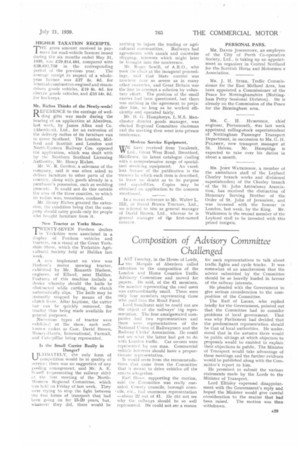Composition of Advisory Committee Challenged
Page 31

If you've noticed an error in this article please click here to report it so we can fix it.
LAST Tuesday, in the House of Lords, the Marquis of Aberdeen called attention to the composition of the London and Home Counties Traffic Advisory Committee and moved for papers. Ele said, of the 41 members, the number representing the road users was extraordinarily small. There were only four members representing those who paid into the Road Fund.
Lord Sandhurst said he could not see the object of the railways' big representation. The four amalgamated companies had two representatives and there acre representatives of the National Union of Railwaymen and the Railway Clerks' Association. He could not see what the latter had got to do with London traffic. Car owners were represented by one man. Commercial vehicle interests should have a proportionate representation.
It would seem from the recommendations that came from the Committee that it meant to drive vehicles off the streets altogether.
Earl Howe, supporting the motion, said the Committee was really onesided. County councils, borough councils, etc., had enormous representation —about 22 out of 41. He did not see why the railways should be so well represented. He could not sec a reason for such representatives to talk about traffic lights and cycle tracks. It was somewhat of an anachronism that the advice submitted by the Committee should be so heavily loaded in favour of the railway interests.
He pleaded with the Government to give serious consideration to the composition of the Committee.
The Earl of Lucan, who replied briefly for the Government, pointed out that the Committee had to consider problems of local government. That was why Parliament had decided that the predominant representation should be that of local authorities. He understood that in the autumn there would be public sittings at which objectors to proposals would be enabled to explain their objections in public. The Minister of Transport would take advantage of these meetings and the further evidence would be published along with the Committee's report to him.
He promised to submit the various statements made by the Lords to the Minister of Transport.
Lord Eltisley expressed disappointment with the Government's reply and hoped the Minister would give careful consideration to the matter that had been raised. The motion was then withdrawn.












































































